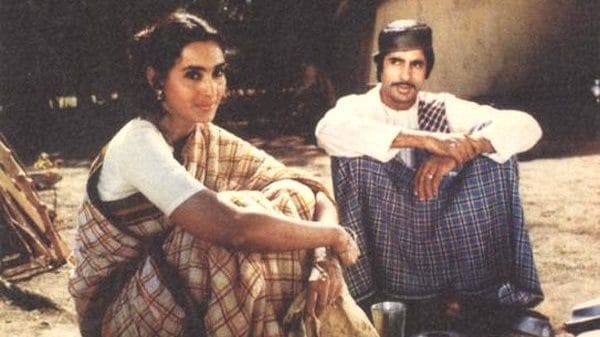Before Barjatyas’ Rajshri Productions became known for their family-centric films like Hum Aapke Hain Koun and Maine Pyar Kiya, they used to make films that would also be nominated as India’s official entry to the Academy Award for Best Foreign Language Film. This week, we revisit Saudagar — the 1973 complex emotional drama starring the never-seen-before trio of Nutan, Amitabh Bachchan, and Padma Khanna. Saudagar was India’s official entry for the 46th Oscars, but was not nominated. Based on Bengali writer Narendranath Mitra’s story Ras, the film is a saga of love, betrayal and hope.
Moti (Amitabh Bachchan) is a palm-juice extractor based in a village of West Bengal. When the season comes, Moti, dressed in a kurta and lungi donning a small Islamic cap travels across beautiful green terrains to extract palm juice (ras), which is further used to make jaggery. But Moti’s jaggery is the best among his contemporaries — and the reason is Majubi (played by Nutan). The widow from Moti’s village apparently makes the best gur (jaggery), which sells like hot cakes.
Moti is also a heartthrob of the village — tall, handsome and an occasional flirter. The young women around him seem to like him. One day he loses his heart to another young woman from the neighbouring village — Phool Banu (Padma Khanna). But here comes a challenge. Phool Banu’s father demands Rs 500 as alimony (meher money paid by the groom to the bride’s family in Islamic marriages).
Despite his flourishing business, Moti cannot arrange the money because not only is the season for palm juice limited, he also has to give Majubi a fair share of his money as her wage. However, at someone’s suggestion, Moti decides to marry Majubi so that he can make and sell more jaggery without having to pay her any wage. The plan works well. He arranges Rs 500, divorces Majubi on account of infidelity, and marries Phool Banu — the love of his life. But would Moti be able to live happily ever after? What would a hurt Majubi do? The film explores it in the second half.
Also read: Nutan’s understated yet powerful performance in Bandini is a masterclass in acting
A grey protagonist
Saudagar was one of the earliest films of Amitabh as a lead character. But he’s not your conventional, good-looking, fighting-the-villain kind of hero, perfectly characterised in Prakash Mehra’s popular hit from earlier that year, Zanzeer.
Saudagar explores various shades of his character. In the opening scene, when Moti is climbing down a palm tree after extracting the juice, a young boy is waiting with an empty vessel. Moti gives some juice to the boy, establishing in the beginning that he is not a bad person. But as the story progresses, the audience sees the selfishness of his character, his unfair behaviour towards Majubi and his immense love for Phool Banu.
Nutan is at her best as the helpless, deeply loving yet courageous Majubi. Even though Amitabh and Padma have significant roles here, one’s heart is with Nutan throughout the film. Her range as the vulnerable woman who is easily convinced into remarriage and as the woman who later confronts Moti when he decides to leave her, is astounding. Padma Khanna also does her job well as the attractive, innocent Phool Banu. She doesn’t know how to run the household as efficiently as Majubi did, but she is not ashamed of it. She refuses to let herself down to fulfil Moti’s expectations.
The film also makes a point about how women’s labour, especially as homemakers, has been taken for granted. Moti’s intention to marry Majubi was only because he wanted to save the jaggery-maker’s wage and needed someone who could also take care of the house.
Director Sudhendu Roy, whose previous directorial (and debut) venture Uphaar was also India’s official entry to the Oscars, does a very convincing job of bringing the flavours of rural Bengal on the screen. The palm tree terrains, water bodies, small markets, and the village scenes transport the viewer to the old worlds of Satyajit Ray or Sarat Chandra Chattopadhyay. The music by Ravindra Jain leaves a mark. Songs like ‘Sajna Hai Mujhe’, ‘Tera Mera Sath Rahe’ have been hummed for decades.
(Edited by Prashant)






